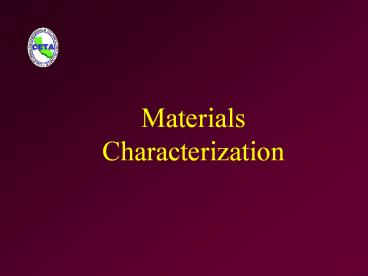Materials Characterization - PowerPoint PPT Presentation
Title:
Materials Characterization
Description:
Materials Characterization – PowerPoint PPT presentation
Number of Views:144
Avg rating:3.0/5.0
Title: Materials Characterization
1
Materials Characterization
2
Learning Objectives
- Identify compressive and tensile forces
- Identify brittle and ductile characteristics
- Calculate the moment of inertia
- Calculate the modulus of elasticity
3
Elasticity
- When a material returns to its original shape
after removing a stress - Example rubber bands
4
Elastic Material Properties
Unstressed Wire
Apply Small Stress
Remove Stress and Material Returns to Original
Dimensions
5
Inelastic Material Properties
Bottle Undergoing Compressive Stress
Unstressed Bottle
Inelastic Response
6
Compression
- Applied stress that squeezes the material
- Example compressive stresses can crush an
aluminum can
7
Compression Example
Unstressed Sponge
Sponge in Compression
8
Compressive Failure
- This paper tube was crushed, leaving an
accordion-like failure
9
Tension
- Applied stress that stretches a material
- Example tensile stresses will cause a rubber
band to stretch
10
Tension Example
- Steel cables supporting I-Beams are in tension.
11
Tensile Failure
- Frayed rope
- Most strands already failed
- Prior to catastrophic fail
12
Tensile Failure
- This magnesium test bar is tensile strained until
fracture - Machine characterizes the elastic response
- Data verifies manufacturing process control
13
Force Directions
- AXIAL an applied force along the length or axis
of a material - TRANSVERSE an applied force that causes bending
or deflection
14
Force Direction Examples
Transverse Stress on the Horizontal Aluminum Rod
Axial Stress on the Vertical Post
15
Graphical Representation
- Force vs. Deflection in the elastic region
16
Yield Stress
- The stress point where a member cannot take any
more loading without failure or large amounts of
deformation.
17
Ductile Response
- Beyond the yield stress point, the material
responds in a non-linear fashion with lots of
deformation with little applied force - Example metal beams
18
Ductile Example
Unstressed Coat Hangar
After Applied Transverse Stress Beyond the Yield
Stress Point
19
Brittle Response
- Just beyond the yield stress point, the material
immediately fails - Example plastics and wood
20
Brittle Example
Unstressed Stick
Brittle Failure After Applied Stress Beyond the
Yield Stress Point
21
Brittle and Ductile Response Graphs
22
Moment of Inertia
- Quantifies the resistance to bending or buckling
- Function of the cross-sectional area
- Formulas can be found in literature
- Units are in length4 (in4 or mm4)
- Symbol I
23
Moment of Inertia forCommon Cross Sections
- Rectangle with height h and length b
- I (in4 or mm4)
- Circle with radius r
- I (in4 or mm4)
h
? ?
bh3
____
? b ?
12
? 2r ?
p r4
____
4
24
Modulus of Elasticity
- Quantifies a materials resistance to deformation
- Constant for a material, independent of the
materials shape. - Units are in force / area. (PSI or N/m2)
- Symbol E
25
Flexural Rigidity
- Quantifies the stiffness of a material
- Higher flexural rigidity stiffer material
- Product of the Modulus of Elasticity times the
Moment of Inertia (EI)
26
Calculating the Modulus of Elasticity
48EI
_______
- Slope
- Measure L
- Calculate I
- Solve for E
L3
Slope is 1.342 lb/in
27
Acknowledgements
- Many terms and the laboratory are based a paper
titled A Simple Beam Test Motivating High
School Teachers to Develop Pre-Engineering
Curricula, by Eric E. Matsumoto, John R.
Johnson, Edward E. Dammel, and S.K. Ramesh of
California State University, Sacramento.































